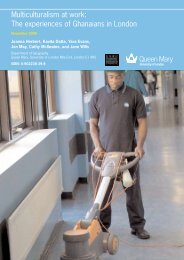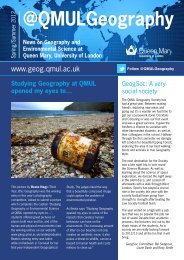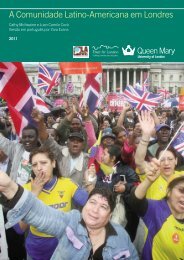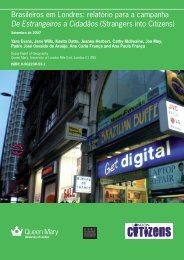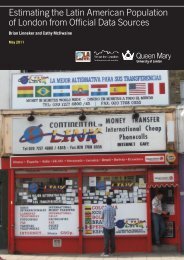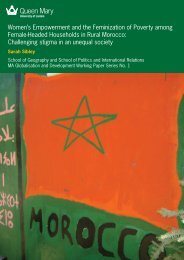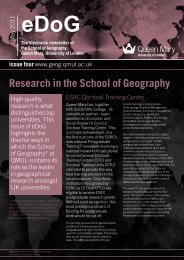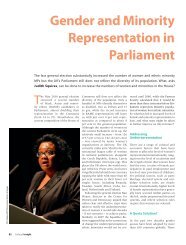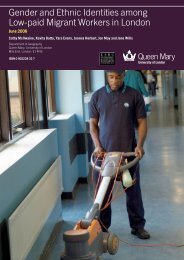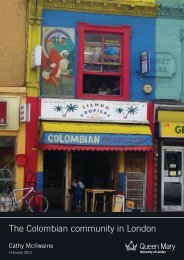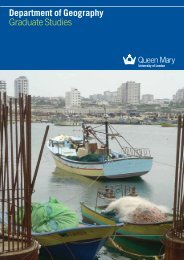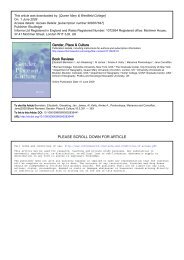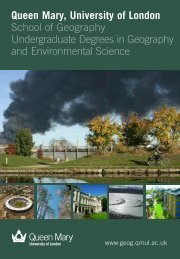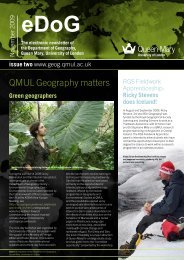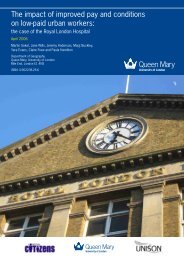MA London Studies - School of Geography - Queen Mary University ...
MA London Studies - School of Geography - Queen Mary University ...
MA London Studies - School of Geography - Queen Mary University ...
Create successful ePaper yourself
Turn your PDF publications into a flip-book with our unique Google optimized e-Paper software.
<strong>MA</strong> <strong>London</strong> <strong>Studies</strong><br />
<strong>School</strong> <strong>of</strong> English and Drama<br />
Department <strong>of</strong> <strong>Geography</strong><br />
Department <strong>of</strong> Politics
Contents<br />
Introduction 04<br />
<strong>MA</strong> <strong>London</strong> <strong>Studies</strong> 05<br />
Core current teaching staff 08<br />
<strong>Queen</strong> <strong>Mary</strong>, <strong>University</strong> <strong>of</strong> <strong>London</strong>:<br />
in the heart <strong>of</strong> the thriving East End 11<br />
The information given in this brochure is correct at the time <strong>of</strong> going<br />
to press.<br />
The College reserves the right to modify or cancel any statement in it<br />
and accepts no responsibility for the consequences <strong>of</strong> any such<br />
changes.<br />
<strong>Queen</strong> <strong>Mary</strong>, <strong>University</strong> <strong>of</strong> <strong>London</strong> 03
Introduction<br />
<strong>London</strong> has long been an international centre<br />
<strong>of</strong> cultural production and political power.<br />
This interdisciplinary Masters programme<br />
takes the city as its focus, using <strong>London</strong> as a<br />
central example, resource and inspiration.<br />
From the world <strong>of</strong> eighteenth-century c<strong>of</strong>fee<br />
houses, to the ‘metro-intellectuals’ <strong>of</strong> the<br />
Romantic era and the vibrant creative life <strong>of</strong><br />
the modern-day postcolonial city, the programme<br />
brings together historical and contemporary<br />
perspectives on metropolitan culture, through<br />
approaches that span the humanities and<br />
social sciences. The <strong>MA</strong> in <strong>London</strong> <strong>Studies</strong> is<br />
collaboratively taught, drawing upon expertise<br />
across the Departments <strong>of</strong> <strong>Geography</strong> and<br />
Politics and the <strong>School</strong> <strong>of</strong> English and Drama.<br />
This results in an attractive and distinctive<br />
Masters programme, driven by the research<br />
interests <strong>of</strong> academic staff and rooted in vital<br />
and intellectually important concerns.<br />
This programme is <strong>of</strong> particular interest to<br />
those wishing to deepen their intellectual<br />
understanding <strong>of</strong> key aspects <strong>of</strong> the cultural<br />
history and contemporary cultural life <strong>of</strong> <strong>London</strong>,<br />
as well as developing a range <strong>of</strong> advanced<br />
analytical and research skills. This knowledge<br />
and experience will have considerable<br />
transferable value in the labour market.<br />
Graduates will be especially well equipped<br />
to pursue careers in the metropolitan arts and<br />
cultural sectors. The research training <strong>of</strong>fered<br />
by the programme also provides a suitable basis<br />
for undertaking PhD research and is therefore a<br />
potential stepping-stone to an academic career.<br />
The <strong>MA</strong> in <strong>London</strong> <strong>Studies</strong> makes the most <strong>of</strong><br />
<strong>Queen</strong> <strong>Mary</strong>’s position, being close to key cultural<br />
resources and institutions in <strong>London</strong>, while<br />
located in the city’s East End where many <strong>of</strong><br />
the programme’s intellectual concerns find<br />
most vivid expression. Dramatic historical<br />
changes, along with contemporary and future<br />
transformations <strong>of</strong> this part <strong>of</strong> the city provide<br />
ample opportunities for scholarly reflection and<br />
debate as well as for engaging with practices<br />
and institutions within and beyond the academy.<br />
04 <strong>Queen</strong> <strong>Mary</strong>, <strong>University</strong> <strong>of</strong> <strong>London</strong>
<strong>MA</strong> <strong>London</strong> <strong>Studies</strong><br />
The course is taught by international experts<br />
in the <strong>School</strong> <strong>of</strong> English and Drama and<br />
Departments <strong>of</strong> Politics and <strong>Geography</strong> who<br />
provide a unique interdisciplinary perspective<br />
on <strong>London</strong> cultures past and present.<br />
Academic staff in all three participating<br />
departments have made landmark contributions<br />
to the historiography <strong>of</strong> <strong>London</strong> and to ways<br />
<strong>of</strong> understanding and theorising contemporary<br />
metropolitan life. They have many wellestablished<br />
research and teaching links with<br />
external organisations and institutions in the<br />
metropolitan arts (for example Artangel, LIFT:<br />
<strong>London</strong> International Festival <strong>of</strong> Theatre) and<br />
cultural sectors (for example the Museum <strong>of</strong><br />
<strong>London</strong>, Geffrye Museum and the V&A), and,<br />
where possible, seek to draw these into the<br />
course programme.<br />
Course structure<br />
The programme is based around a core course<br />
Cities and Modernity that considers a number<br />
<strong>of</strong> influential perspectives on understanding<br />
modern metropolitan life. Referring to <strong>London</strong> as<br />
an example, but setting it in the context <strong>of</strong> other<br />
cities across the world, the course explores how<br />
modern cities are experienced, represented and<br />
contested, and provides an important conceptual<br />
basis for other elements <strong>of</strong> the programme.<br />
A core advanced level research training course,<br />
delivered by the Department <strong>of</strong> <strong>Geography</strong> and<br />
the <strong>School</strong> <strong>of</strong> English and Drama, ensures that<br />
you will also receive a thorough grounding in<br />
archival and qualitative research methodologies.<br />
You are also introduced to and encouraged to use<br />
the unsurpassed resources for the study <strong>of</strong><br />
<strong>London</strong> available in the city: libraries, archives,<br />
museums, galleries, as well as sites and events.<br />
These include the British Library, the Museum<br />
<strong>of</strong> <strong>London</strong>, Guildhall Library and the <strong>London</strong><br />
Metropolitan Archives. This training provides an<br />
essential preparation for a compulsory 15,000-<br />
word dissertation an independent research<br />
project on a topic defined by your own work and<br />
interests.<br />
Specialist options<br />
In addition to these compulsory elements <strong>of</strong> the<br />
programme, you will choose to study three <strong>of</strong> the<br />
following option courses:<br />
Art, Performance and the City<br />
This course provides a detailed examination <strong>of</strong><br />
a series <strong>of</strong> cultural practices working to shape<br />
urban experience and spaces in the East End <strong>of</strong><br />
<strong>London</strong>. Through an engagement with primary<br />
materials as well as site visits and walks, it aims<br />
to introduce you to the activities <strong>of</strong> cultural<br />
practitioners and artists (such as Tim Bennam,<br />
Janet Cardiff, Rachel Whiteread, and Iain<br />
Sinclair) who are involved in imagining,<br />
representing and performing the cultural<br />
geographies <strong>of</strong> the city.<br />
Cities and Empire<br />
This course deals with imperial and colonial<br />
cities. It seeks to understand how urban forms<br />
are shaped by imperial, colonial and postcolonial<br />
processes, and how those cities are central to<br />
the way that imperialism, colonialism and<br />
postcolonialism are understood and<br />
experienced. A central focus is on <strong>London</strong>,<br />
but the course also draws upon other cities,<br />
including Calcutta and Jerusalem.<br />
<strong>Queen</strong> <strong>Mary</strong>, <strong>University</strong> <strong>of</strong> <strong>London</strong> 05
<strong>MA</strong> <strong>London</strong> <strong>Studies</strong> (cont)<br />
Empire, Race and Immigration<br />
Focusing especially on <strong>London</strong>, this course<br />
examines how colonial and racial migrants<br />
experienced, contested and negotiated<br />
moving to Britain and the types <strong>of</strong> reactions<br />
they provoked over the last three hundred years.<br />
Particular emphasis is placed on how empire,<br />
race, class and gender informed both colonial<br />
and metropolitan attitudes.<br />
Health, Housing and Education <strong>of</strong><br />
Immigrants in a Metropolitan Environment<br />
Using an historical foundation, this course sets<br />
out to identify the contemporary issues which<br />
surround the health, housing and education<br />
<strong>of</strong> immigrants in a metropolitan environment.<br />
It uses East <strong>London</strong> as a case study to enable<br />
students to acquire an awareness <strong>of</strong> the social,<br />
political and cultural conditions which result<br />
from the concentration <strong>of</strong> minority groups in a<br />
restricted urban space. Students will receive<br />
instruction from both academics and<br />
practitioners in the relevant fields.<br />
Metro-intellectuals, 1770-1820:<br />
British Women Writers in <strong>London</strong> and Paris<br />
This courses focuses on the works <strong>of</strong> four<br />
important women intellectuals in the period <strong>of</strong><br />
enlightenment reform and romantic radicalism.<br />
Anna Laetitia Barbauld, <strong>Mary</strong> Wollstonecraft,<br />
Helen Maria Williams, and <strong>Mary</strong> Robinson all<br />
participated in the debates and at times, the<br />
events <strong>of</strong> agitation for domestic political reform<br />
in Britain and international revolution as<br />
proposed by the events in the American and<br />
French Revolutions. While this module aims<br />
to address the particular situation <strong>of</strong> women<br />
intellectuals with strong ties to metropolitan<br />
experience, it will place these writers in relation<br />
to the debates at large in the period.<br />
Sociability: Literature and the City 1660-1780<br />
This course focuses on the representation <strong>of</strong><br />
the city in the literature <strong>of</strong> the Restoration and<br />
eighteenth century. In this period, <strong>London</strong> was<br />
the largest and most prosperous city in Europe.<br />
The course debates how writers responded<br />
to the new experiences <strong>of</strong> city life, a form <strong>of</strong><br />
sociability subsequently identified as the birth<br />
<strong>of</strong> urbanism. It will examine how this cultural<br />
and historical transformation can be read in<br />
and through experiments in literary genre<br />
and style in the period.<br />
Urban Culture and the Book: <strong>London</strong>,<br />
Publishing and Readers in the Sixteenth Century<br />
The course explores processes <strong>of</strong> publication<br />
and practices <strong>of</strong> reading in <strong>London</strong> in the<br />
sixteenth century, looking at the production<br />
and circulation <strong>of</strong> both manuscripts and<br />
printed books. Topics covered will include the<br />
relationship between authors and ‘publishers’ <strong>of</strong><br />
various kinds; the workings <strong>of</strong> patronage; readers<br />
and their responses to the books they read; the<br />
implications <strong>of</strong> book format and design; editorial<br />
activities and processes <strong>of</strong> canon formation.<br />
Writing the East End<br />
This course considers the mythology <strong>of</strong> the East<br />
End <strong>of</strong> <strong>London</strong> as articulated and interrogated by<br />
literary texts. It focuses on the period from the<br />
turn <strong>of</strong> the twentieth century to the present day<br />
and examines the East End as a continuing site <strong>of</strong><br />
public fascination and creative production. In<br />
particular, it explores the ways that fiction and<br />
prose writing have represented the East End as a<br />
06 <strong>Queen</strong> <strong>Mary</strong>, <strong>University</strong> <strong>of</strong> <strong>London</strong>
site <strong>of</strong> immigration, cross-class encounter, crime,<br />
political activism and memory.<br />
Please note that we regularly change, update<br />
and add to our courses – for the latest details,<br />
see www.qmul.ac.uk/london-studies<br />
This programme is subject to approval but is due to commence<br />
in 2007.<br />
Teaching methods<br />
and resources<br />
Most teaching takes place in small group<br />
seminar classes where there is ample opportunity<br />
to discuss and debate course related themes and<br />
issues. These are supplemented by a range <strong>of</strong><br />
other teaching methods including site visits<br />
(to museums and archives), field walks and<br />
student-led conference presentations. There is<br />
also a substantial component <strong>of</strong> private study<br />
and reading. Assessment methods are equally<br />
varied, including: extended essays, book reviews,<br />
short reports, projects and presentations. There<br />
are no examinations. You will be allocated a<br />
research supervisor with whom you will meet on<br />
a regular, one-to-one basis throughout the<br />
course. There is also a dedicated <strong>MA</strong> <strong>London</strong><br />
<strong>Studies</strong> tutor.<br />
Lock-keeper’s Cottage by the Regent’s Canal.<br />
You will have access to more specialist sources <strong>of</strong><br />
research expertise such as the newly formed City<br />
Centre and the Centre for the Study <strong>of</strong> Migration.<br />
More broadly, you will become part <strong>of</strong> <strong>Queen</strong><br />
<strong>Mary</strong>’s lively intellectual culture and, over and<br />
above your studies, will be encouraged to attend<br />
and participate in the wide variety <strong>of</strong> seminars<br />
and talks given by distinguished visiting<br />
speakers. You will also have access to the<br />
excellent facilities and resources <strong>of</strong> the Graduate<br />
<strong>School</strong> in the Humanities and Social Sciences,<br />
including the new Graduate Centre, which<br />
occupies the refurbished and extended<br />
<strong>Queen</strong> <strong>Mary</strong>, <strong>University</strong> <strong>of</strong> <strong>London</strong> 07
Core current teaching staff<br />
Pr<strong>of</strong>essor Alison Blunt (Department <strong>of</strong> <strong>Geography</strong>)<br />
Alison Blunt’s research interests span cultural,<br />
feminist and postcolonial geographies, with<br />
a particular focus on imperial travel and<br />
domesticity and on geographies <strong>of</strong> home, identity<br />
and mixed descent. Her recent books include:<br />
Domicile and Diaspora: Anglo-Indian Women<br />
and the Spatial Politics <strong>of</strong> Home (2005) and<br />
Home (2006).<br />
Pr<strong>of</strong>essor Julia B<strong>of</strong>fey<br />
(<strong>School</strong> <strong>of</strong> English and Drama)<br />
Julia B<strong>of</strong>fey’s research and teaching are<br />
concerned with various aspects <strong>of</strong> literary and<br />
cultural production in the medieval and early<br />
modern periods. She is author <strong>of</strong> Fifteenthcentury<br />
English DreamVisions: An Anthology<br />
(2005).<br />
Pr<strong>of</strong>essor Markman Ellis<br />
(<strong>School</strong> <strong>of</strong> English and Drama)<br />
Markman Ellis’s research focuses on historical<br />
approaches to eighteenth-century literature and<br />
culture. His publications include The C<strong>of</strong>fee<br />
House: A Cultural History (2005) and The History<br />
<strong>of</strong> Gothic Fiction (2001).<br />
Pr<strong>of</strong>essor Anne Janowitz<br />
(<strong>School</strong> <strong>of</strong> English and Drama)<br />
Pr<strong>of</strong>essor Janowitz’s work focuses on late<br />
eighteenth-century and Romantic literary<br />
culture, and the history and theory <strong>of</strong> poetry and<br />
poetics. She is author <strong>of</strong> Women Romantic Poets<br />
(2005) and is currently working on a study <strong>of</strong><br />
eighteenth and nineteenth-century <strong>London</strong><br />
poetry, entitled The Sky at Night: poetic<br />
commonplaces <strong>of</strong> urban light.<br />
Dr Anne Kershen (Department <strong>of</strong> Politics)<br />
Anne Kershen works on immigration in <strong>London</strong><br />
(both past and present), Anglo-Jewish history<br />
and labour history. Her most recent book is<br />
Strangers, Aliens and Asians: Huguenots, Jews<br />
and Bangladeshis in Spitalfields 1660-2000<br />
(2005)<br />
Dr Shompa Lahiri (Department <strong>of</strong> Politics)<br />
Shompa Lahiri’s current research explores<br />
the relationship between empire, race and the<br />
colonial ‘other’ within the British metropolis.<br />
She is author <strong>of</strong> Indians in Britain: Anglo-Indian<br />
Encounters, Race and Identity (1999)<br />
Pr<strong>of</strong>essor Jon May (Department <strong>of</strong> <strong>Geography</strong>)<br />
Jon May is interested in the social and cultural<br />
geography <strong>of</strong> cities. His recent research has<br />
focused on the geographies <strong>of</strong> street<br />
homelessness in British cities and migrant labour<br />
and low paid employment in contemporary<br />
<strong>London</strong>. He is author <strong>of</strong> Swept up lives: Reenvisioning<br />
the Homeless City (2007)<br />
08 <strong>Queen</strong> <strong>Mary</strong>, <strong>University</strong> <strong>of</strong> <strong>London</strong>
Pr<strong>of</strong>essor Miles Ogborn<br />
(Department <strong>of</strong> <strong>Geography</strong>)<br />
Miles Ogborn’s research has explored the<br />
emergent ‘spaces <strong>of</strong> modernity’ in eighteenthcentury<br />
<strong>London</strong> and the historical geography<br />
<strong>of</strong> state formation and spaces <strong>of</strong> discipline in<br />
nineteenth-century Britain. He is currently<br />
working on the historical geographies <strong>of</strong><br />
globalisation 1492-1800. His publications<br />
include: Spaces <strong>of</strong> Modernity: <strong>London</strong>’s<br />
Geographies, 1680–1780 (1998) and Indian<br />
Ink: Script and Print in the Making <strong>of</strong> the English<br />
East India Company (2007)<br />
Dr Alastair Owens (Department <strong>of</strong> <strong>Geography</strong>)<br />
Alastair Owens’s research focuses on the<br />
historical geographies <strong>of</strong> gender, wealth and<br />
investment in the nineteenth and twentieth<br />
centuries and on the material culture <strong>of</strong> everyday<br />
life in Victorian cities. He is editor <strong>of</strong> Women,<br />
Business and Finance in Nineteenth-Century<br />
Europe: Rethinking Separate Spheres (2006)<br />
and review editor <strong>of</strong> the <strong>London</strong> Journal.<br />
Dr David Pinder (Department <strong>of</strong> <strong>Geography</strong>)<br />
David Pinder’s research focuses on utopianism<br />
and cities, particularly in relation to the visions <strong>of</strong><br />
twentieth-century modernist and avant-garde<br />
groups such as the situationists; and on art,<br />
spatial practices and the politics <strong>of</strong> urban space<br />
in <strong>London</strong> and New York. He is author <strong>of</strong>: Visions<br />
<strong>of</strong> the City: Utopianism, Power and Politics in<br />
Twentieth-Century Urbanism (2005).<br />
immigration to the East End <strong>of</strong> <strong>London</strong>, and her<br />
most recent publications include: The Jewess<br />
in Nineteenth-Century British Literary Culture<br />
(2007) and ‘The Jew’ in Late-Victorian and<br />
Edwardian Culture: Between the East End<br />
and East Africa (2006).<br />
Further information<br />
Information about fees is included in the <strong>Queen</strong><br />
<strong>Mary</strong> Graduate <strong>School</strong> Prospectus, which will be<br />
sent on request. An application form for<br />
postgraduate courses is included in the<br />
prospectus. Alternatively see:<br />
www.qmul.ac.uk/postgraduate/index.html<br />
The Arts and Humanities Research Council <strong>of</strong>fer<br />
studentships for Masters study in preparation for<br />
PhD Research, for which the closing date is 1<br />
May each year. Details <strong>of</strong> eligibility and<br />
application procedures can be obtained from:<br />
Arts and Humanities Research Council<br />
Whitefriars<br />
Lewins Mead<br />
Bristol<br />
BS1 2AE<br />
Tel: +44 (0)117 987 6500<br />
www.ahrc.ac.uk<br />
Dr Nadia Valman (<strong>School</strong> <strong>of</strong> English and Drama)<br />
Nadia Valman's research has focused on<br />
representations <strong>of</strong> Jews in British culture.<br />
She is currently working on literature and<br />
<strong>Queen</strong> <strong>Mary</strong>, <strong>University</strong> <strong>of</strong> <strong>London</strong> 09
How to apply<br />
Applicants will normally be expected to possess<br />
a first or upper second class honours degree<br />
(or equivalent international qualification) in a<br />
humanities or social science subject. We actively<br />
encourage applications from students who<br />
have developed an interest in metropolitan<br />
history, culture or literature, urban and cultural<br />
geography, or urban politics at undergraduate<br />
level. We also welcome applications from cultural<br />
practitioners, pr<strong>of</strong>essionals and others with an<br />
enthusiastic intellectual interest in <strong>London</strong>.<br />
Application forms can be requested from,<br />
and should be returned to:<br />
The Admissions and Recruitment Office<br />
<strong>Queen</strong> <strong>Mary</strong>, <strong>University</strong> <strong>of</strong> <strong>London</strong><br />
Mile End Road<br />
<strong>London</strong><br />
E1 4NS<br />
United Kingdom<br />
email: admissions@qmul.ac.uk<br />
For further information or informal enquiries<br />
please contact:<br />
The Admissions Tutor<br />
<strong>London</strong> <strong>Studies</strong><br />
Department <strong>of</strong> <strong>Geography</strong><br />
<strong>Queen</strong> <strong>Mary</strong>, <strong>University</strong> <strong>of</strong> <strong>London</strong><br />
Mile End Road<br />
<strong>London</strong><br />
E1 4NS<br />
United Kingdom<br />
Tel: +44 (0) 20 7882 5400<br />
email: london-studies@qmul.ac.uk<br />
www.qmul.ac.uk/london-studies<br />
10 <strong>Queen</strong> <strong>Mary</strong>, <strong>University</strong> <strong>of</strong> <strong>London</strong>
<strong>Queen</strong> <strong>Mary</strong>, <strong>University</strong> <strong>of</strong> <strong>London</strong>:<br />
in the heart <strong>of</strong> the thriving East End<br />
The area surrounding <strong>Queen</strong> <strong>Mary</strong>’s Mile End<br />
Campus is culturally diverse and rich in history.<br />
For over 300 years, <strong>London</strong>’s East End was the<br />
shipping and mercantile centre <strong>of</strong> the capital and<br />
home to enormous dockyards, stretching from<br />
Tower Bridge along the Thames into Essex and<br />
Kent. Because <strong>of</strong> its history as a port, there is a<br />
long tradition <strong>of</strong> immigration, integration and<br />
shifting populations, mirrored in the changing<br />
architecture, culture, religion, commerce and<br />
industry <strong>of</strong> the area. Since the College was<br />
established in 1885 as the People’s Palace<br />
Technical <strong>School</strong>s, the imposing façade <strong>of</strong> the<br />
<strong>Queen</strong>s’ Building has seen kaleidoscopic<br />
changes in its surroundings, no more so than<br />
over the last 25 years.<br />
On and around Brick Lane, to the west <strong>of</strong> <strong>Queen</strong><br />
<strong>Mary</strong>, the former garment factories and bagel<br />
shops have evolved into the curry houses and<br />
the Bollywood video emporia <strong>of</strong> <strong>London</strong>’s ‘Bangla<br />
Town’. The Whitechapel Road, adjacent to The<br />
Royal <strong>London</strong> Hospital and <strong>Queen</strong> <strong>Mary</strong>’s new<br />
Medical <strong>School</strong>, is dominated by the East <strong>London</strong><br />
Mosque (opened in 1985). In the last few years,<br />
the revitalised areas <strong>of</strong> Shoreditch and Hoxton<br />
have hosted a vibrant cultural scene, with Jay<br />
Jopling’s White Cube 2 and the Whitechapel Art<br />
Gallery, and the studios and workshops <strong>of</strong> artists<br />
such as Tracey Emin.<br />
The £12 million redevelopment <strong>of</strong> Mile End Park<br />
has improved the view from the new canal-side<br />
Westfield Student Village. A ‘green bridge’,<br />
designed by architect Piers Gough and opened<br />
in June 2002, links parkland, leisure and<br />
sporting facilities on either side <strong>of</strong> Mile End Road.<br />
The twenty-first century sees the area once<br />
again on the brink <strong>of</strong> further transformation<br />
as construction begins on the sporting and<br />
infrastructure facilities for the <strong>London</strong> Olympic<br />
Games in 2012, which will have a dramatic<br />
impact on <strong>Queen</strong> <strong>Mary</strong>’s environment.<br />
The area has also long been significant in the<br />
formation <strong>of</strong> policies to tackle urban poverty and<br />
problems, thereby playing a crucial role in the<br />
development <strong>of</strong> the welfare state and the future<br />
not only <strong>of</strong> the capital but also the nation.<br />
Postgraduate students are eligible for College<br />
accommodation both on the College campus and<br />
elsewhere in <strong>London</strong>, but East <strong>London</strong> also has<br />
a thriving – and for <strong>London</strong> unusually good value<br />
– private rented sector through which many<br />
students choose to live within walking distance <strong>of</strong><br />
the campus.<br />
<strong>Queen</strong> <strong>Mary</strong>, <strong>University</strong> <strong>of</strong> <strong>London</strong> 11
This guide has been produced by<br />
the Publications and Web Office<br />
for <strong>Geography</strong> - DL1983<br />
For further information contact:<br />
The Admissions Tutor<br />
<strong>London</strong> <strong>Studies</strong><br />
Department <strong>of</strong> <strong>Geography</strong><br />
<strong>Queen</strong> <strong>Mary</strong>, <strong>University</strong> <strong>of</strong> <strong>London</strong><br />
Mile End Road<br />
<strong>London</strong><br />
E1 4NS<br />
United Kingdom<br />
Tel: +44 (0) 20 7882 5400<br />
email: london-studies-ma@qmul.ac.uk<br />
www.qmul.ac.uk/london-studies



